Prime Minister Shinzo Abe issued a statement about Japan's wartime history Aug. 14, one day before the 70th anniversary of the end of World War II. The Genron NPO took the occasion to question well-informed figures in Japan, China and South Korea about their views concerning the statement, and released details of the findings Aug. 24.
More than 90 percent of polled people in China, South Korea aware of the release of Abe statement, indicating it has drawn very strong attention
First of all, well-informed figures in China and South Korea were asked whether they know about the Abe statement. Those who replied they know about the statement accounted for 91.4 percent of the Chinese polled and 96.9 percent of the South Koreans polled, indicating the statement has drawn very strong attention from Chinese and South Korean people.
(China and South Korea only)
Prime Minister Abe issued a statement about Japan's wartime history Aug. 14,
one day before the 70th anniversary of the end of World War II. Do you know that he released the statement?
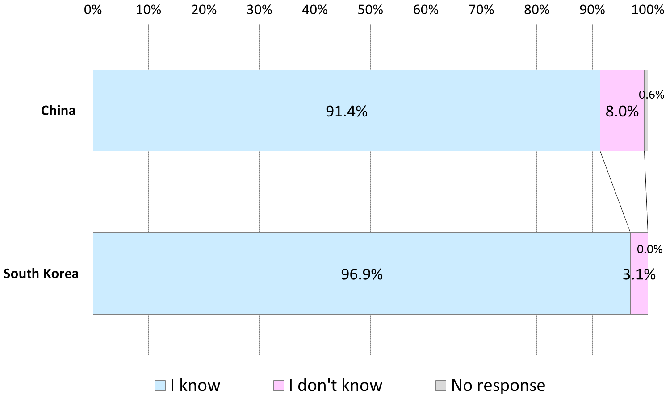
Opinions in Japan sharply divided on Abe statement
Those with unfavorable views surpass 50 percent in China, but favorable views aired by about 20 percent of Chinese polled
Those with unfavorable views surpass 80 percent in South Korea
Next, well-informed figures in the three countries were asked whether they are satisfied with the Abe statement. The Japanese polled were sharply divided on how they view the statement. Those who replied they were satisfied or relatively satisfied with the statement accounted for 45.6 percent, as against 41.7 percent for those who replied in the negative.
Of the Chinese polled, 56.9 percent had unfavorable views while 21.4 percent of them were in favor of the statement.
In South Korea, the percentage of those with unfavorable views climbed to 83.1 percent.
Are you satisfied with the Abe statement? (Single reply)
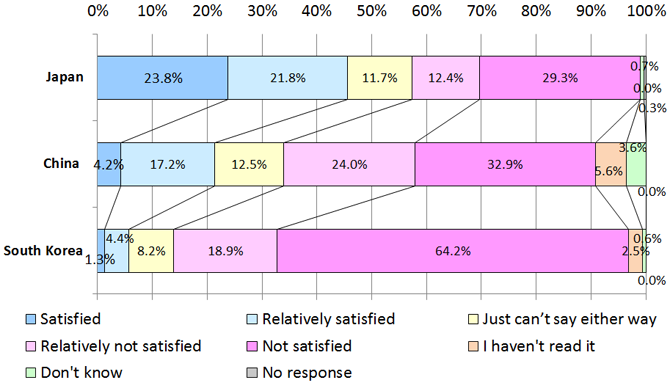
Note1:
(Japanese question) Japanese Prime Minister Shinzo Abe has announced the "War Anniversary Statement" on August 14, a day before the end of World War II. Are you satisfied with the Abe Statement?.
(Chinese question) In the past, the Murayama Statement and the Koizumi Statement have been announced to commemorate the anniversaries of the end of World War II, the Abe Statement has caught attentions domestically and internationally. Are you satisfied with the Abe Statement?
(South Korean question) Are you satisfied with the Abe Statement?
Well-informed figures in South Korea more negative than those in China
Then, polled figures in China and South Korea were asked whether the Abe statement amounts to Japan's remorse for its aggression against other Asian countries. Of the people polled in China, 64.7 percent replied they did not feel so or relatively did not feel so. Meanwhile, 20.8 percent of them replied they felt or relatively felt Japan's remorse from the statement, indicating these people perceived Japan's remorse for its aggression during the last war.
Of the South Koreans polled, 88.7 percent replied they did not feel so. Only 2.5 percent of them replied they felt Japan's remorse. The findings show South Korean people are more negative toward the Abe statement than Chinese people, the same pattern as seen in the previous question.
(China and South Korea only)
Do you feel the Abe statement amounts to Japan's remorse for its aggression in
Asia?
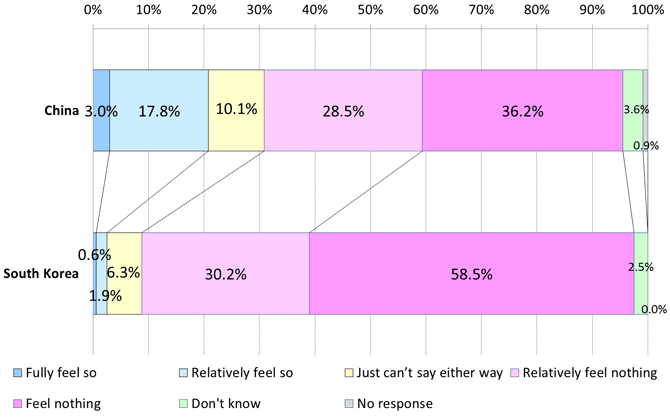
(Japan only)
What do you think about the Abe statement? (Multiple replies acceptable)
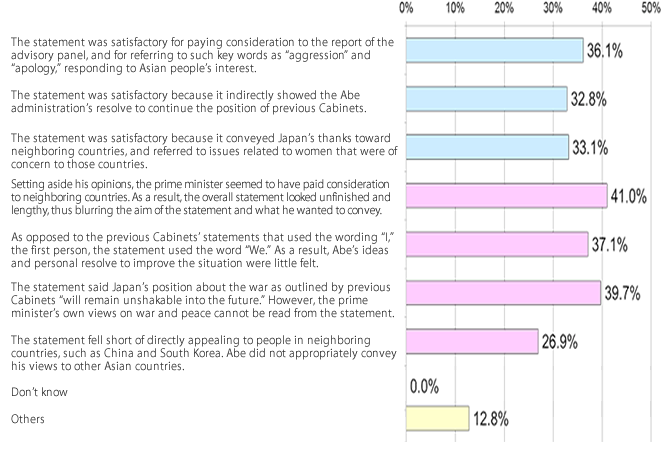
Many well-informed figures in China, South Korea doubt if Abe statement will contribute to improving Japan's relations with China, South Korea
Still, nearly 30 percent of Chinese polled in favor of the statement
The polled figures were also asked whether the Abe statement will contribute to improving Japan's relations with China and South Korea.
The most frequently mentioned reply was "Just can't say either way" in the poll in Japan. The percentage of those who replied so was 35.2 percent, followed by 25.5 percent for those who replied the statement will contribute to improving Japan's relations with the two countries and 25.0 percent for those who replied in the negative.
In the poll in China, well over half of the respondents, 54.9 percent, replied that they are negative or relatively negative about whether the statement will contribute to improving the situation. Meanwhile, 29.3 percent of them showed positive or relatively positive views toward the statement.
Of the South Koreans polled, the favorable replies accounted for a meager 6.3 percent while 74.9 percent of the respondents were negative toward the statement.
Question to Japanese - Do you think the Abe statement is contributory to improving Japan's relations with China and South Korea?
Question to Chinese - Do you think the Abe statement is contributory to improving Japan's relations with China?
Question to South Koreans - Do you think the Abe statement is contributory to improving Japan's relations with South Korea?
(Single reply)
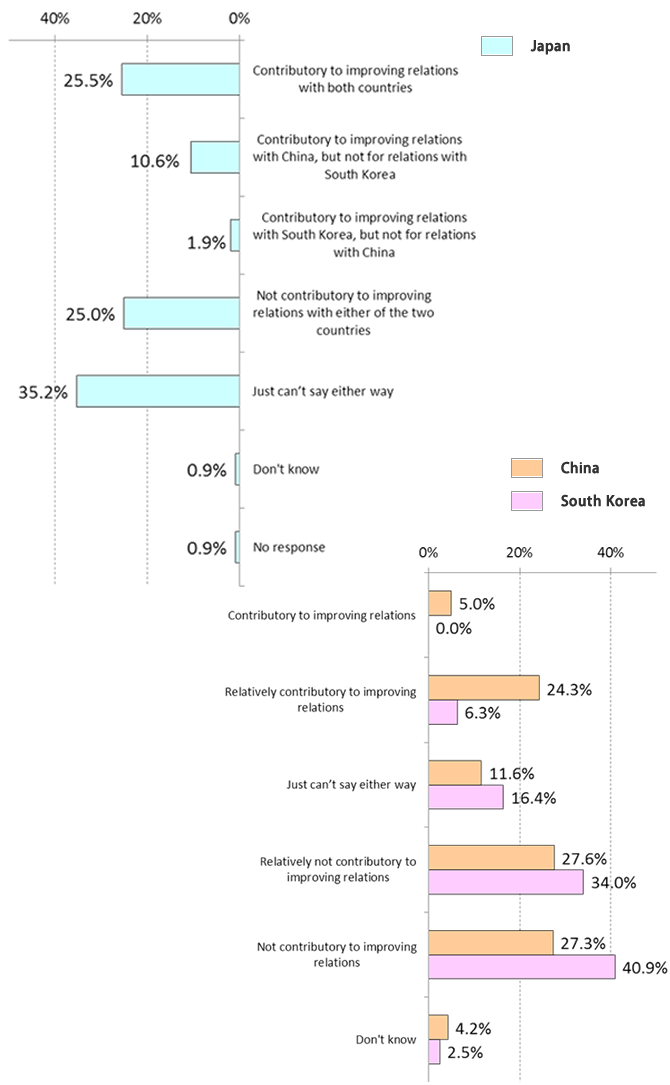
Aug. 15 speech by South Korean President Park Geun-hye favored by many well-informed figures in Japan, South Korea
South Korean President Park Geun-hye delivered a speech at a National Liberation Day ceremony Aug. 15, one day after the Abe statement was released. In the speech, she said that there are "quite a few lamentable portions" in the statement. But she showed some satisfaction with the statement, noting that the prime minister made it clear that Japan's traditional position about the war, notably its apology and remorse for the wartime incidents, "will remain unshakable in the coming years." Well-informed figures in Japan and South Korea were asked about their views concerning her remarks.
According to the poll in Japan, 56.0 percent of the respondents were satisfied or relatively satisfied with the president's remarks. This far surpassed the 18.0 percent for those who had unfavorable views about her speech. Overall, well-informed Japanese figures were basically satisfied with her remarks.
A similar pattern appeared in the replies from well-informed figures in South Korea. Nearly half of the polled in South Korea, specifically 48.4 percent, were in favor of her remarks; 9.4 percent of the polled were satisfied with her speech and 39.0 percent were relatively so. Meanwhile, 31.5 percent of the South Koreans polled did not favor her speech; 17.0 percent of them replied they were dissatisfied with her remarks and 14.5 percent replied they were relatively dissatisfied.
People polled in Japan and South Korea were asked whether they expect Park's remarks will contribute to improving relations between Japan and South Korea in the coming years. Of the Japanese polled, 49.6 percent replied that they think or relatively think that her remarks will contribute to improving relations between the two countries. Those with negative or relatively negative views about the course of relations between the two countries following her remarks came to only 14.0 percent.
Of the South Koreans polled, 43.4 percent replied that they think or relatively think that her remarks will contribute to improving relations between Japan and South Korea. Those with negative views came to 29.5 percent. The reply "Just can't say either way" was heard from 23.9 percent of the South Koreans polled. This indicated that a certain portion of well-informed figures in South Korea are uncertain about how the president's remarks will influence the course of relations between the two countries.
(Japan and South Korea only)
(Japanese question)
South Korean President Park delivered a speech at a National Liberation Day ceremony Aug. 15, following the release of the Abe statement, and said that there are "quite a few lamentable portions" in the statement. But she showed some satisfaction with the statement, noting that the prime minister made it clear that Japan's traditional position about the war "will remain unshakable in the coming years." Are you satisfied with her speech?
(South Korean question)
On August 15, President Park delivered a speech at a National Liberation Day and presented her position on Korea-Japan relations. Are you satisfied with her speech?
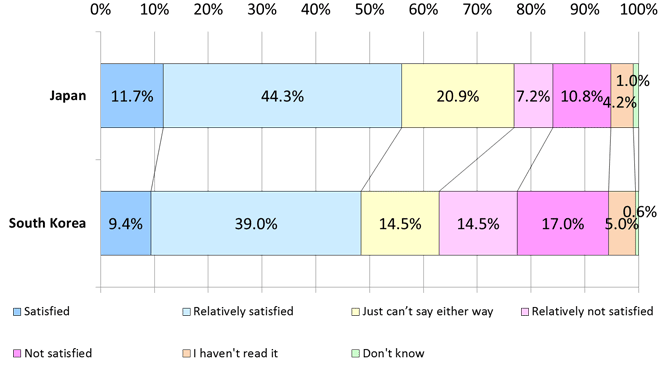
(Japan and South Korea only)
Do you think President Park's stance on Japan-South Korea relations, as expressed in her latest speech, is contributory to improving relations between the two countries?
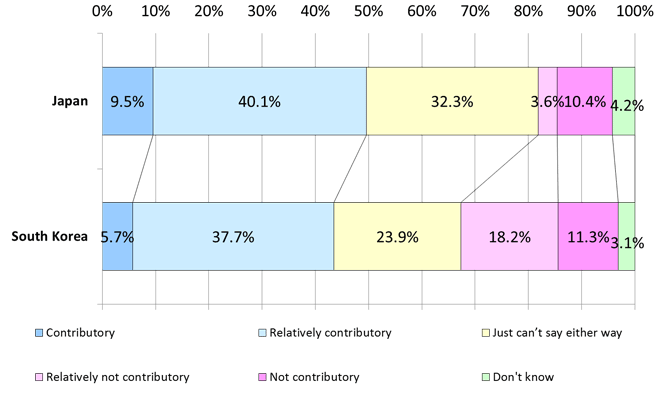
Overall, well-informed South Korean figures more negative toward Abe statement than those in China
When the findings of the polls in China and South Korea are compared to each other, well-informed figures in South Korea sounded more negative toward the Abe statement than those in China.
Outline of questionnaire
Well-informed Japanese and South Korean figures were asked in a joint survey by The Genron NPO and South Korea's East Asia Institute. Polls in Japan were directed at about 6,000 people who have participated in Genron activities so far, who were asked to reply between Aug. 18 and 21, 2015. Replies were obtained from 307 of the figures for analysis.
Polls in South Korea were directed at people who subscribe to EAI newsletters, to whom the questionnaire was sent between Aug. 20 and 22. Replies were obtained from 159 of the figures for analysis.
Polls in China were directed at well-informed figures who have taken part in the Tokyo-Beijing Forum meetings Genron has organized with its Chinese counterpart over the past 10 years. The questionnaire was sent to them between Aug. 18 and 21. Replies were obtained from 337 of them for analysis.
Post a comment